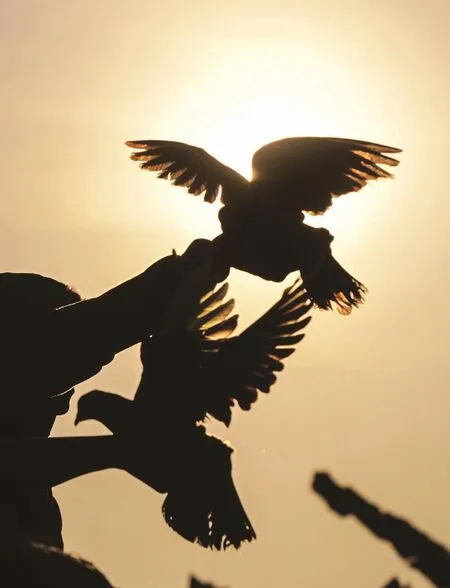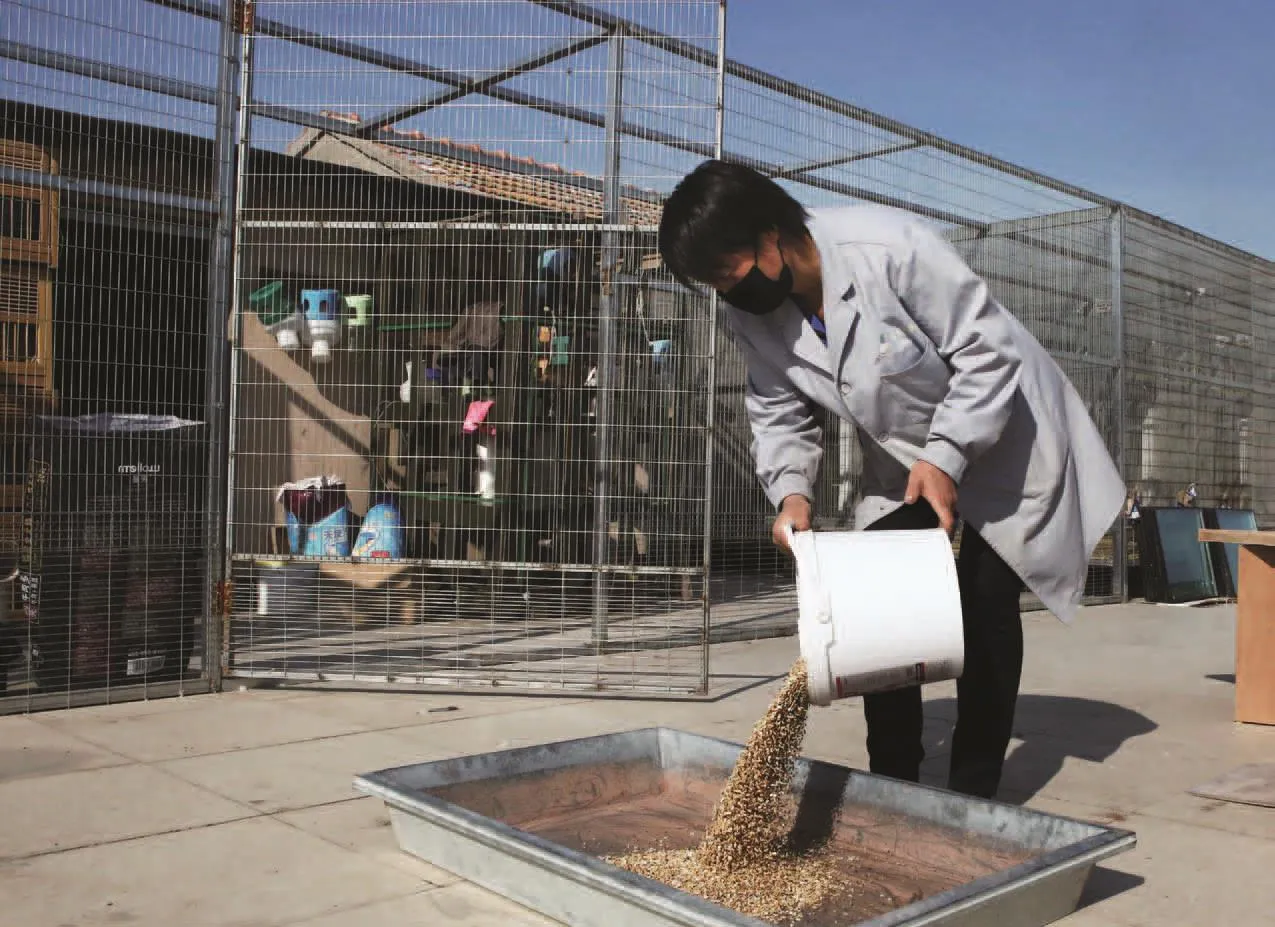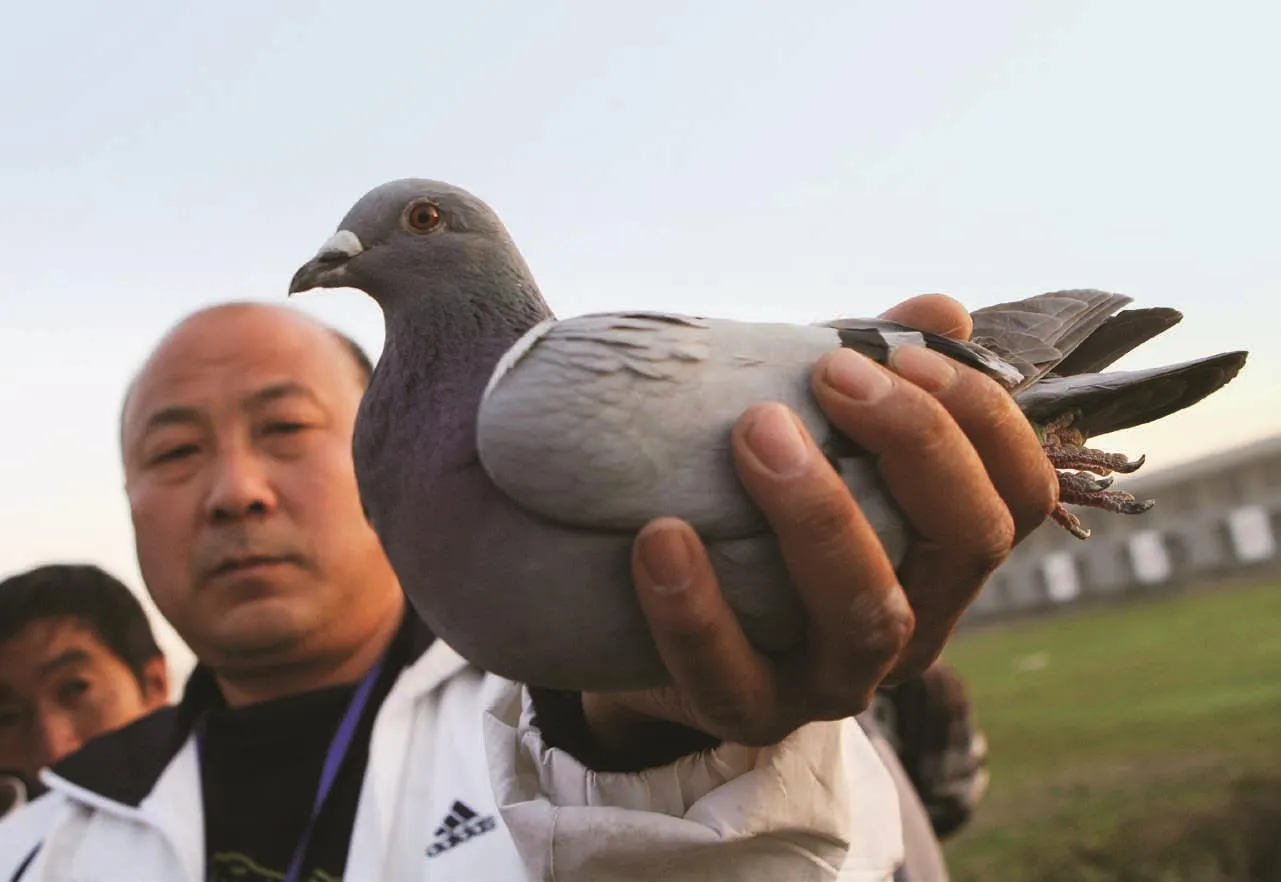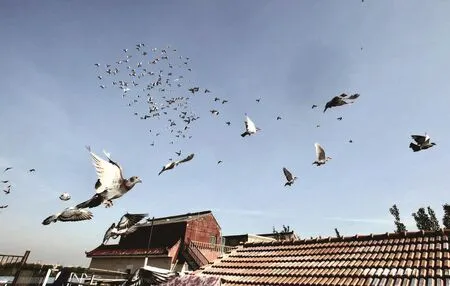RULING THE ROOST
BY TAN YUNFEI (譚云飛)

With big money invading pigeonracing, hobbyists wonder about the future of their time-honored sport
悠閑養鴿人遭遇百億賽鴿潮

Since the early afternoon,Hou Yong (pseudonym) has been watching the sky for the return of one of his 50 racing pigeons as it finds its way home from nearly 700 kilometers away in a pigeon race on April 29.
The previous morning, the 60-yearold Beijing resident had brought the 2-year-old bird to the Guang’an Gymnasium as his sole entry to the Beijing Xicheng District Racing Pigeon Association (BXDRPA).There,the bird and 1,181 of its fellow racers were loaded into nine-layered metal cages on a truck and transported to a parking lot in Zhoukou, Henan province, where they were released at precisely 6:08 a.m.the following day to fly back to their respective homes in Beijing.
As soon as each racing pigeon lands on the electronic pad at the door of its home, a chip embedded in its foot ring automatically sends its time of arrival and its owner’s address to the race organizer, down to the exact millisecond.When TWOC spoke to Hou at 4:30 p.m., over 100 birds had already returned home, with the fastest arriving at 3:08 p.m.—having taken exactly nine hours to complete the trip at an average speed of 71.3 kilometers per hour.
“To race is the only meaning of raising these pigeons,” Jin Bing(pseudonym), another Beijing pigeon racer in his 50s, declares to TWOC.“The joy of keeping racing pigeons lies in their instinctive homing ability even when they’re transported hundreds of kilometers away.”
But it’s becoming an increasingly pricey sport to pursue.Over the last century, pigeon racing has transformed from a simple hobby into a business worth billions of RMB, opening the door to corruption and organized crime.According to Chinese Racing Pigeon, a bi-monthly magazine published by the Chinese Racing Pigeon Association (CRPA), the prize money of all pigeon races in China in 2015 alone totaled over 28.1 billion RMB.A single race can generate a pool of billions of RMB in prize money, and a prizewinning pigeon can sell for millions.A champion pigeon in a 2018 auction in Beijing fetching 22 million RMB.
China has a long history of breeding pigeons, initially for food during the Zhou dynasty (1046-256 BCE), and later as couriers for letters and military correspondence in the Sui (581-618)and Tang (618-907) dynasties.A Chinese idiom for sending letters, 飛鴿傳書, literally translates to “flying pigeons delivering letters.” Pigeonracing was first recorded in the 1640s when, according to Chinese Racing Pigeon magazine, so-called “pigeon-release meetings” were held in Foshan,Guangdong province, with prize money awarded for the fastest birds.In the Qing dynasty (1616-1911)keeping pigeons and other pet birds for their looks and charming coos was popular among the nobility and the rich in the capital—a hobby known as “carrying the cage and displaying the birds (提籠架鳥),” still popular enough to remain a staple sight in Beijing’s hutongs right up to today.
China’s National Sports Commission recognized pigeon-racing as a sport in 1961, but during the Cultural Revolution from 1966 to 1976, racing was suspended due to promoting“idleness” and “capitalist lifestyle.”Today, though, the sport thrives:There were over 10,000 pigeon races held per year from 2015 to 2019.As of 2020, there were 400,000 registered pigeon breeders in China and over 25 million foot rings issued that year,over half of the global total, Huang Jian, deputy president of the CRPA,told China Newsweek magazine last November.The CRPA, a non-profit NGO that has regulated the sport since 1984, now has 33 provincial branches, and over 1,600 associations across China including the BXDRPA,which Hou belongs to.
The hobby requires serious dedication.Jin, who used to keep 200 to 300 birds before cutting down to 50 due to his age, starts each day by attending to his pigeons at around 6 a.m.: releasing them, cleaning the loft where they roost, and then feeding the birds and cleaning again when they return two to three hours later.
Hou, who considers himself a novice, releases and feeds his pigeons only once a day, though this still takes him four to five hours each afternoon.In the evening before going to bed,he also returns to the loft to tend to their needs.“It requires more effort than taking care of children,” he says,explaining that breeders need to keep an eye on every unusual movement.Common intestinal troubles may cost a pigeon’s life, and even when cured, the bird may never race again.
In July and August, prior to the autumn racing season that usually spans September to November, pigeons take part in extra training sessions.Hou drives the pigeons 30 to 100 kilometers away every day and opens their cages, and the birds immediately fly back home.

Pigeon breeders register their birds for a race in Beijing
“All pigeon breeders dream of winning a championship,” Guo Zhanfa, a national pigeon-racing judge and head judge of the BXDRPA, tells TWOC.He admits,though, that this may remain a dream for many breeders despite a lifetime’s effort, because a pigeon race is full of uncertainty.“It requires favorable climatic, geographical, and human conditions.”
The conditions are many: wellbred and trained pigeons, favorable weather, and not running into predators or “bird-nappers” (people who net racing pigeons to sell) along the way.Ancestry is considered one of the most important factors.“Pigeons with European bloodlines, such as Belgian and Dutch ones, which are larger and stronger, are considered better than domestic ones,” says Guo, who was unwilling to splurge on European pigeons.Instead, he borrowed their descendants from his friends to breed with.
However, even a match of the best available pigeons cannot guarantee good descendants.“You just need to try,to see if their genes and blood go well together.Sometimes, you can only find out whether it worked on race day,”Guo points out.
Meanwhile, even the best pigeon may fall victim to bird-nappers, who later contact their original owners for ransom money or sell them on online platforms like Kuaishou.These pigeons are sold for tens to thousands of RMB,based on the species, according to Hou.
Since he does not have time to train his pigeons himself, Guo focuses on“One Loft” races organized by clubs, a form introduced from Europe into the Chinese mainland via Taiwan in the 1990s.In these races, keepers register and submit pigeons at around 40 days old in the spring for the organizers to raise and train by autumn.Even then,winning is big money: One of Guo’s birds won 80,000 RMB in a 2006 race, around twice the average annual income of a Beijing resident at the time, and that was just the third prize.
Since then, though, it’s grown increasingly hard for Guo’s pigeons to swoop onto the winning list.“There are more and more imported pigeons from Europe, and mine can’t compete with them,” Guo explains.He has heard that some racers spend millions of yuan renting a loft in the suburbs in Beijing to raise and train their birds.
Nikolaas Gyselbrecht, CEO of the auction website Pigeon Paradise in Belgium, told The New York Times last November that 50 percent of the company’s annual volume of business,totaling about 50 million USD, was from China, and he expected prices to rise.For instance, the rules of Kaier International Charity One Loft Race in 2019 (which charges an entry fee of 16,800 RMB per bird), showed the prize money pool totaled 1 billion RMB, and the top 10 winners can take home between 1 and 6 million RMB.Birds placed from 11th to 600th place can earn 100,000 RMB.

Each racing pigeon has a unique identification number on its foot ring

Pigeons receive different feeds before a race, during pregnancy,and depending on the season
But racers say that the big money lies not in the race itself, but in“designation.” In addition to prize money, pigeon racers can pay an extra fee ranging from several hundred to 20,000 RMB to “designate” their birds and win money back from the pool depending on how their pigeons place—similar to betting in a horse race, except racers can only wager on their own birds.“This is actually gambling,” says Jin, the Beijing racer,who claims around 70 percent of pigeon racers bet money in these competitions.
Zhu Qiji, president of the BXDRPA who had been a sport official for over 20 years, has similar concerns.“There is no boundary if the sport is oriented around gambling,” he points out, calling for more governmental regulations and supervision.
The matter is becoming urgent, as the high stakes have invited crime and fraud.In a 700-kilometer pigeon race held by the Shanghai Racing Pigeon Association in May 2017, two men trained their birds one year in advance to fly to a loft near the release site in Henan.There, the birds were put in milk cartons, and taken by high-speed train back to Shanghai to be released near their home loft.They won the first four places and prize money that totaled over 3 million RMB—but the men were fined and given suspended three-year prison sentences after the organizers discovered their con.
Even race organizers can be guilty of dirty tricks.In June 2018, to make up for the shortfall between the total entry fees of 1.5 million RMB and the announced prize money of 3.88 million RMB, the organizer of a One Loft race in Anhui province selected 300 pigeons belonging to his own acquaintances, as well as some strays,and released them two days earlier than the other entrants in the hope of not forking out the prize money.Other organizers have been reported for using fake foot rings to manipulate race results.
According to Zhu, fixed races can largely be prevented if association judges are present to supervise the whole process from registration of the birds to tallying the race results,which is not mandatory at present.If the CRPA or its subordinate chapters are not involved in a race, many clubssimply set their own rules.He think that the sports bureau and civil affairs bureau can also get involved in regulating pigeon clubs.“Pigeon race clubs and companies may operate simply with a business license from the industrial and commercial bureau,” he laments.“There is too much work for the CRPA to do.”
“Only 5 percent of [racing] pigeon keepers earn money and 5 percent break even, but the remaining 90 percent just lose money,” Jin claims.Guo estimates he spent around 40,000 RMB on his 100 pigeons for expenses like food, medicine, and race entry fees last year, but the total prizes he wins typically only amounts to the entry fees for the year.
Those problems do not seem to bother Hou.With a limited budget,the retiree is content with small-stakes races organized by the BXDRPA,with entry fees of 15 to 30 RMB per bird based on the race distance.
At his friends’ suggestion, he registered with the BXDRPA to participate in races in 2001.But before that, pigeons had already been a part of his life for decades—he got his first two birds as a gift from a neighbor in his hutong in elementary school.
Now, he reads books on pigeonkeeping, watches videos by experienced trainers on Kuaishou,and exchanges breeding pigeons with trusted friends.He’s sad when his pigeons get lost or hurt during training and races.“Sometimes they return home a month or two later,very thin and weak,” he says.“I get an ache in my heart.”
Hou’s bird from the 700-kilometer race on April 29 finally returned around 6:00 p.m., and lost him 80 RMB—30 RMB for the entry fee and 50 RMB for “designation.” Though the results were disappointing, since the same pigeon had outflown 6,000 others in a 500-kilometer race 10 days before, Hou remains optimistic.“It can be discouraging to keep finishing offof the winning list, but I don’t actually lose anything even if I don’t win.I just like the birds,” he says.“It’s only a hobby, and it makes people happy.”

One pigeon racer displays his prizewinning bird after a 500-kilometer race in Xi’an,Shaanxi province

Pigeons are released once or twice a day for race training
As his association’s spring races wrap up, Hou will focus on breeding and training hatchlings (known as“squabs”) for races coming up this autumn and next spring.“[I will]continue until I’m too old to climb the stairs,” he says, chuckling and gesturing to the pigeon coop he built on his rooftop.“It’s like a drug.Once you’re in, there’s no getting out.”
With the sky gradually darkening,TWOC prepares to leave Hou as he scans the still-empty horizons at the April 29 race.“This culture is deeper than a PhD,” he declares.“You can graduate from a PhD.There is no graduating from this.”

